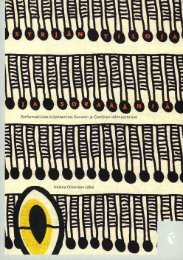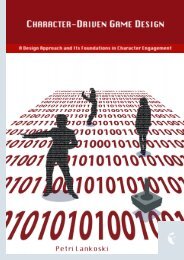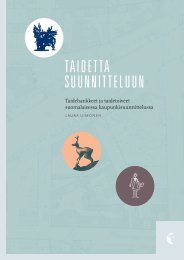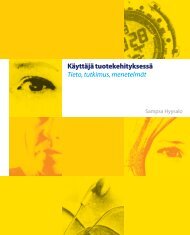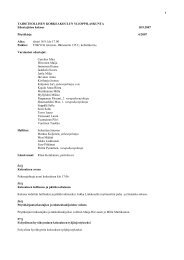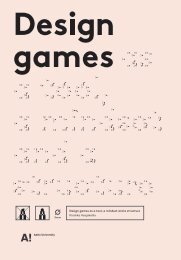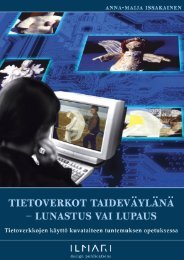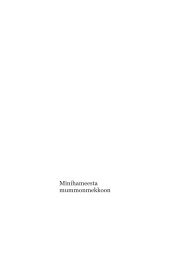Lightness and Brightness and Other Confusions
Lightness and Brightness and Other Confusions
Lightness and Brightness and Other Confusions
Create successful ePaper yourself
Turn your PDF publications into a flip-book with our unique Google optimized e-Paper software.
MAURICE MERLEAU-PONTY 20 proceeds in the same direction. He widens, defines<br />
<strong>and</strong> reconstructs the concept of the world of meanings that Heidegger<br />
tries to describe with his concept being-in-the-world (Heidegger 1986, p 313).<br />
To human beings perception is the direct access to the world. We exist in the<br />
world before being able to reflect upon it. The human world is created in<br />
interaction <strong>and</strong> communication between the body <strong>and</strong> the surrounding world,<br />
<strong>and</strong> knowledge must be constituted as interplay with the world. Merleau-<br />
Ponty wants to show that I think of necessity must be based upon I perceive –<br />
percipio precedes cogito. (Merleau-Ponty 2002, pp 250–252). He describes<br />
the coherence of consciousness <strong>and</strong> nature: the perceived world establishes<br />
the development of the human <strong>and</strong> social world, which forms a significant<br />
connected whole of cultural, social <strong>and</strong> political contents <strong>and</strong> expressions. It<br />
can change <strong>and</strong> be reinterpreted, but can never totally be taken in or controlled<br />
by the individual. It is implicitly present in all perceptions. (Merleau-<br />
Ponty 2002, p 403–408).<br />
KARL POPPER 21 in a similar way describes the human <strong>and</strong> social world with<br />
what he calls World 3, the content of which is the totality of thoughts, theories<br />
<strong>and</strong> formulations in culture: scientific theories, poetry, art, etc. (Popper<br />
1997, p 61). According to Popper, World 3 has a (more or less) independent<br />
existence of established tradition of objective knowledge that cannot easily be<br />
influenced by individuals. (Popper’s World 1 <strong>and</strong> World 2 describe direct<br />
perception of the world <strong>and</strong> a personal inner world respectively). (Popper<br />
1997, p 62).<br />
To Descartes <strong>and</strong> Locke objects are entirely objects <strong>and</strong> consciousness entirely<br />
consciousness, <strong>and</strong> the surrounding world, in principle, what it appears<br />
to be. Merleau-Ponty (<strong>and</strong> Popper) present more ambivalent relations between<br />
human consciousness <strong>and</strong> the external world; to man the world is<br />
neither entirely nature nor entirely consciousness. None of them outweighs<br />
the other: neither nature (nor culture), nor consciousness. (Merleau-Ponty<br />
2002, pp 96–98).<br />
From a scientific perspective <strong>and</strong> without any connection to philosophical<br />
considerations Arne Valberg points out that many properties that we normally<br />
attribute to the external world (like contrasts, movement <strong>and</strong> depth)<br />
rely heavily on perception. In the light of these facts he finds it underst<strong>and</strong>able<br />
that there are philosophers regarding all vision as an illusion. He also<br />
remarks that it is almost impossible to distinguish between ‘neural’ <strong>and</strong> ‘cognitive’<br />
levels of perceptual patterns (Valberg 2005, p 28); vision is even to a<br />
natural scientist as Valberg (as to Merleau-Ponty) neither entirely nature nor<br />
entirely consciousness. What Merleau-Ponty, from a philosophical perspective,<br />
<strong>and</strong> Valberg, from a scientific point of view, claim is that human experi-<br />
20<br />
French philosopher, 1908–1961<br />
21<br />
Austrian-British philosopher, 1902–1994<br />
21




